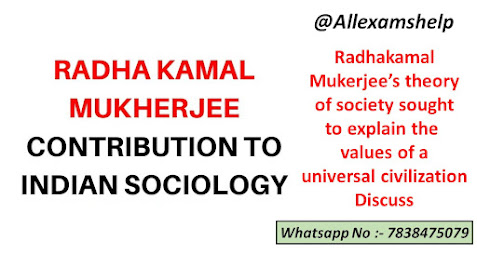Radhakamal Mukerjee was an Indian sociologist who developed a theory of society that sought to explain the role of culture in shaping social structure and human behavior. He argued that culture was a fundamental determinant of social organization and that it played a key role in shaping individual and collective behavior.
Radhakamal Mukerjee’s
theory of society sought to explain the values of a universal civilisation’.
Discuss
According to
Mukerjee, culture could be broadly defined as a set of shared beliefs, values,
and practices that characterized a society or a group of people. He believed
that culture was not a static or homogenous entity, but rather a dynamic and
evolving system that changed over time and was influenced by a range of social,
economic, and political factors.
Mukerjee
identified several key elements of culture that he believed were central to
understanding society. These included language, religion, art, science, and
technology. He argued that these elements were interconnected and that they
played a crucial role in shaping human behavior and social structure.
Mukerjee's
theory of society was influenced by his belief in the importance of cultural
diversity and his commitment to promoting cultural pluralism. He believed that
societies should embrace and celebrate their cultural differences rather than
seeking to impose a single, universal culture on all people.
Overall,
Mukerjee's theory of society emphasized the importance of culture in shaping
social structure and individual behavior. It highlighted the complex and
dynamic nature of cultural systems and their role in shaping human societies.
Radhakamal
Mukerjee was an Indian sociologist who made significant contributions to the
development of sociology in India during the 20th century. One of his key
contributions was his theory of a 'universal civilization' which sought to
explain the values that underpinned societies around the world.
Mukerjee's
theory was based on the premise that human societies were not isolated from
each other but rather connected through shared values and beliefs. He argued
that these shared values formed the basis of a universal civilization that was
present in all societies, regardless of their geographic location, historical
period, or cultural background.
Mukerjee
identified three core values that he believed were present in all societies:
truth, non-violence, and beauty. He argued that these values formed the
foundation of a universal civilization that could provide a framework for
understanding and comparing different societies.
Mukerjee's
theory of a universal civilization was influenced by his deep interest in the cultural
diversity of India and his belief that Indian culture had much to offer the
world. He saw the values of truth, non-violence, and beauty as being
particularly important in Indian culture and believed that they could provide a
model for other societies to follow.
However,
Mukerjee's theory has been criticized by some scholars who argue that it fails
to account for the unique historical, cultural, and social factors that shape
different societies. They argue that the values that are important in one society
may not be as important in another, and that universalizing values in this way
can lead to cultural homogenization and the erasure of local cultures.
For SOLVED PDF & Handwritten
WhatsApp No :- 7838475019
In conclusion,
Mukerjee's theory of a universal civilization sought to explain the values that
underpinned societies around the world. While his ideas have been influential
in the development of sociology in India, they have also been subject to
criticism from scholars who argue that they fail to account for the unique
historical, cultural, and social factors that shape different societies.
